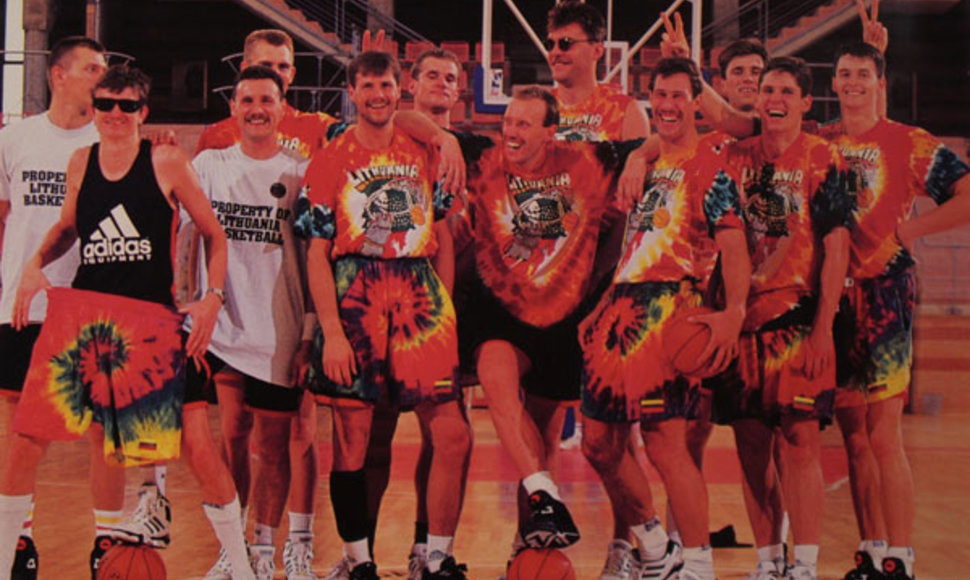“The Other Dream Team” is a documentary film directed by Marius A. Markevičius, an American of Lithuanian decent. The inspirational story of the 1992 Lithuania national basketball team and their incredible journey from the clutches of Communism to the Summer Olympics in Barcelona. It stars many famous basketball persons like Yao Ming, Arvydas Sabonis, David Stern, Jim Lampley, Bill Walton, Šarūnas Marčiulionis, Pau Gasol and others.
The documentary premiered in this year's Sundance Film Festival and had its first showing in Lithuania on Monday. The screening at “Stars & Legends” sports bar was attended by many legends of Lithuanian basketball that starred in the film: Arvydas Sabonis, Šarūnas Marčiulionis, Valdemaras Chomičius, Artūras Karnišovas, as well as other sports representatives and politicians, including MEP Vytautas Landsbergis, President Valdas Adamkus, and Prime Minister Andrius Kubilius.
“I am fascinated by the film. I've always loved Lithuania, but now I love it even more,” said Chomičius, member of the 1992 Olympic team, after the screening. “I wathced this historic footage, capturing the nation's striving for freedom and going forward. It all relates to basketball, our ambition on the court, what we wanted to prove while in the USSR team and claiming we were Lithuanians. That we came from Kaunas.”
“It's a good film. I'm always glad to recall those events. I think the films is a treat to Lithuania's youth, since it's a tiny lesson into history,” said Sabonis.
Another Dream Team
The Barcelona Summer Games are remembered for the invincible American roster of NBA stars that won gold, led by Michael Jordan, Magic Johnson, and Larry Bird. But it was the third-place Lithuanians, sponsored by the Grateful Dead, American rock band, and sporting tie-dye warmups on the medal stand, that won everyone else’s heart.
About three years ago, Markevicius reached out to Marčiulionis, who played six seasons in the NBA, with the idea of a documentary. His film background interested Marčiulionis, as did the fact that the 35-year-old
filmmaker was ostensibly an outsider. “He said he’d been approached many times by people in Lithuania [to make a documentary],” confides Markevicius to the Hollywood Reporter. “But the media there is pretty sensationalist and the players had been burned there a lot by talking so they were very skeptical. I think it took an outsider to understand the perspective a little more.”
That’s not to say that being 100 percent Lithuanian himself didn’t help his cause. In fact, Markevicious initially conducted some of the interviews with the players in English, a language many of them speak extremely well. But once their on-camera conversations deepened, he sensed some reluctance. “Going in depth on all these philosophical and political issues, we could see a little hesitancy so we just made an executive call: Let them speak in their native language,” says Markevicius. “Immediately, you could see them relax in the chair, telling stories and anecdotes and emotions — I think we got a lot deeper into the issues.”
“At a certain point, I think we were four-for-four on making our interview subjects cry,” said producer Jon Weinbach, after a packed screening of the film at Sundance. “Which was very humbling and also very gratifying in that we knew we had a very special story that these guys were getting so emotional.”
Moved American audiences
The emotion was on display at the world premiere in Sundance Film Festival in Park City. Marciulionis and next-generation star Jonas Valančiūnas — who had to sit in the back row so they wouldn’t block anyone’s view — were moved by the retelling of their story. A week later at another screening, it was the American audience shedding tears as the little country with a population half the size of Indiana grooved to the tunes of the Grateful Dead and brought home an Olympic medal. “I’ve actually been surprised by the American response,” says Markevicius. “A mom came up to me the other day and said. ‘All my kids see is negative stuff in the news about how America is now with the down economy and war.’ She’s like, ‘We need more stories like this.’ So that’s been very inspiring and shows it can play in theaters.”
Markevicious begins the film in the aftermath of the USSR's 1988 Olympics basketball win, a triumph fueled by four Lithuanian starters and a victory that led directly the introduction of NBA players to Olympic rosters in order to help the United States regain its lapsed hoops dominance.
From there, the documentary simultaneously journeys back to the roots of the Lithuanian obsession with basketball – Pranas Lubinas and the 1939 European championship – and country's many decades of vicious occupation by the Soviet Union. We then go into the '70s and '80s, meeting the generation of players who would anchor the teams that won medals in three straight Olympics, a core led by Sabonis and Šarūnas Marčiulionis. This is woven into Lithuania's reemergence as a independent nation and the 1992 team credited with reestablishing and reasserting the Lithuanian international presence.
With interviews ranging from the Lithuanian basketball players to Lithuanian heads of states, Bill Walton and even Mickey Hart of The Grateful Dead, the film is a feel-good story. One highlight of the film is a subplot focusing on Jonas Valančiūnas, younger generation basketball player, and his rise to become a high pick in the 2011 NBA draft - a lasting reminder of the opportunities Lithuanians have because of the path paved by the 1992 team.


















